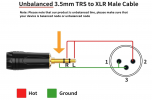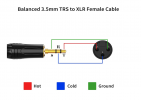-
WANTED: Happy members who like to discuss audio and other topics related to our interest. Desire to learn and share knowledge of science required. There are many reviews of audio hardware and expert members to help answer your questions. Click here to have your audio equipment measured for free!
- Forums
- Audio, Audio, Audio!
- DACs, Streamers, Servers, Players, Audio Interface
- Audio Interfaces (ADC & DAC)
You are using an out of date browser. It may not display this or other websites correctly.
You should upgrade or use an alternative browser.
You should upgrade or use an alternative browser.
E1DA Cosmos ADC
- Thread starter mansr
- Start date
IVX
Major Contributor
I'm 100.00% sure we have it physically. Sunny is very busy these days, Chinese New Year, perhaps she forgot to update the shop storage.
Hi all
I have Cosmos ADC already.
So if I want to better match input sensitivty with DAC output voltage, is Cosmos SCALER a good option to do that?
For example for very low DAC output voltage , like 1Vrms - Scaler is a good option?
Any other advantages that Scaler would give to ADC?
I have Cosmos ADC already.
So if I want to better match input sensitivty with DAC output voltage, is Cosmos SCALER a good option to do that?
For example for very low DAC output voltage , like 1Vrms - Scaler is a good option?
Any other advantages that Scaler would give to ADC?
IVX
Major Contributor
Well, 1V DAC could be transparently amplified by the Scaler up to 10V and feed the ADC.
staticV3
Master Contributor
- Joined
- Aug 29, 2019
- Messages
- 8,068
- Likes
- 12,976
Yes, you can use the Scaler to amplify voltages to the ADC's input sensitivity.For example for very low DAC output voltage , like 1Vrms - Scaler is a good option?
Using the Scaler, voltages down to 85mVrms can be amplified to the ADC's highest sensitivity of 1.7Vrms.
This helps to minimize the impact that the Cosmos ADC's inherent noise and distortion has on your measurements.
The Scaler's very high input impedance of 200/100kΩ (Bal/Unbal) acts as a buffer to improve impedance bridging to the ADC.Any other advantages that Scaler would give to ADC?
If you want to test devices with high output impedance, then this will manifest as lower voltage drop and lower distortion, again: minimizing the impact that the Cosmos ADC has on your measurements.
The downside, if you could call it that, is that the Scaler can only amplify. It never attenuates. That is a great benefit for measuring line level devices like DACs and preamps of various types. The high impedance is also helpful for the measurements and is more comparable to the impedance the devices under test would encounter in actual use.
If you're testing power amplifiers, you need a suitable load that'll dissipate a lot of power anyway. Eight ohms and 200 watts or whatever. Using that with the internal attenuator in the Cosmos ADC covers most of the amplifier cases. The internal attenuator's impedance doesn't really, ahh, load down the test load. If that makes sense.
If you're testing power amplifiers, you need a suitable load that'll dissipate a lot of power anyway. Eight ohms and 200 watts or whatever. Using that with the internal attenuator in the Cosmos ADC covers most of the amplifier cases. The internal attenuator's impedance doesn't really, ahh, load down the test load. If that makes sense.
The Scaler's very high input impedance of 200/100kΩ (Bal/Unbal) acts as a buffer to improve impedance bridging to the ADC.
If you want to test devices with high output impedance, then this will manifest as lower voltage drop and lower distortion, again: minimizing the impact that the Cosmos ADC has on your measurements.
+1
@Music1969 you only “need” the scaler if you are dealing with devices with have high output impedance and want to test frequency response. Capacitor coupled preamps for example will have a hefty bass roll off which doesn’t happen with regular amps. For a 1 kHz test tone it doesn’t matter and if you set the E1DA it’s so good in 10V mode that unless you are going for 118 dB or better SINAD, it’s fine.
The scaler acts as a buffer which addresses the bass roll off and it’s a super clean amplifier. If you are trying to measure to the 122-124 dB SINAD, perfect gain matching is critical.
MultiTone is your best tool for playing with the E1DA. There is a thread where Paul shows the automated test he did with the RME 2/4
+1
@Music1969 you only “need” the scaler if you are dealing with devices with have high output impedance and want to test frequency response. Capacitor coupled preamps for example will have a hefty bass roll off which doesn’t happen with regular amps. For a 1 kHz test tone it doesn’t matter and if you set the E1DA it’s so good in 10V mode that unless you are going for 118 dB or better SINAD, it’s fine.
The scaler acts as a buffer which addresses the bass roll off and it’s a super clean amplifier. If you are trying to measure to the 122-124 dB SINAD, perfect gain matching is critical.
MultiTone is your best tool for playing with the E1DA. There is a thread where Paul shows the automated test he did with the RME 2/4
Actually, while your roll-off comment is entirely accurate, there's other reasons why a higher impedance for the test gear might be important. Lots of devices you might want to test could be sensitive to the load they're presented with. Low impedance might cause higher distortion. Yeah, that's not perfect, but it's a real thing in the real world.
Here's one example:
Example of 10K load versus 100K
That’s a great point. I just wanted to encourage @Music1969 to go ahead and start testing since even that example shows the distortion at a pretty low value so he’ll be OK to start playing with it and getting useful data.Actually, while your roll-off comment is entirely accurate, there's other reasons why a higher impedance for the test gear might be important. Lots of devices you might want to test could be sensitive to the load they're presented with. Low impedance might cause higher distortion. Yeah, that's not perfect, but it's a real thing in the real world.
Here's one example:
Example of 10K load versus 100K
A frequency response sweep may help identify if it will be an issue or not.
Hi @IVX - I have been using the below adapter with Cosmos ADC.Oh yeah, looks better.
Now I have the Cosmos Scaler - should I still use this adapter with Cosmos ADC?
For example: if I have only Scaler only Left output -> this adapter -> Cosmos ADC ?
I pretty sure you use the 'Auto' setting at full CCW knob position.Also - with Cosmos Scaler - if I want to change the default 4.5Vrms auto ranger output level : where can I find instructions please?
yes i know that but that wasn't my questionI pretty sure you use the 'Auto' setting at full CCW knob position.
Archimago review said you can change default 4.5Vrms - my question is how
staticV3
Master Contributor
- Joined
- Aug 29, 2019
- Messages
- 8,068
- Likes
- 12,976
Input the target voltage to the Scaler's left input, then in <2 seconds, change the gain control from manual to auto five times.Archimago review said you can change default 4.5Vrms - my question is how
If you want to reset the target voltage to default, do the same with <1V at the Scaler's left input.
Input the target voltage to the Scaler's left input, then in <2 seconds, change the gain control from manual to auto five times.
If you want to reset the target voltage to default, do the same with <1V at the Scaler's left input.
Thanks! Do you also know answer to my query above : #1,432
staticV3
Master Contributor
- Joined
- Aug 29, 2019
- Messages
- 8,068
- Likes
- 12,976
It'll be difficult to get the Scaler to only output from its left output.Now I have the Cosmos Scaler - should I still use this adapter with Cosmos ADC?
For example: if I have only Scaler only Left output -> this adapter -> Cosmos ADC ?

If you input a stereo signal into the Scaler, then the output will be stereo as well.
If you input a mono signal into the Scaler's left input, then it'll output that Mono signal out of both outputs so that you don't have to switch cables around when changing between Mono and Stereo.
So while it is certainly possible to use that splitter on your picture to connect Scaler and ADC, IVX has made it so that you can use the same 3.5mm to XLR cables for both stereo and mono applications.
Crystal clear explanationIt'll be difficult to get the Scaler to only output from its left output.
If you input a stereo signal into the Scaler, then the output will be stereo as well.
If you input a mono signal into the Scaler's left input, then it'll output that Mono signal out of both outputs so that you don't have to switch cables around when changing between Mono and Stereo.
So while it is certainly possible to use that splitter on your picture to connect Scaler and ADC, IVX has made it so that you can use the same 3.5mm to XLR cables for both stereo and mono applications.
Thank you
IVX
Major Contributor
Music1969, the first pic seems to be wrong. If you are talking about the short cable 3.5mm to male XLR to tie Cosmos APU to Cosmos ADC, please keep the pinout like your balanced pic shows(S-1; R-3; T-2). Please, use only as short as possible cables and well shielded too. @sarieri can tell the long story about fighting with noise without shielding at all 
Similar threads
- Replies
- 4
- Views
- 409
- Replies
- 267
- Views
- 27K
- Replies
- 4
- Views
- 1K
- Replies
- 26
- Views
- 3K


